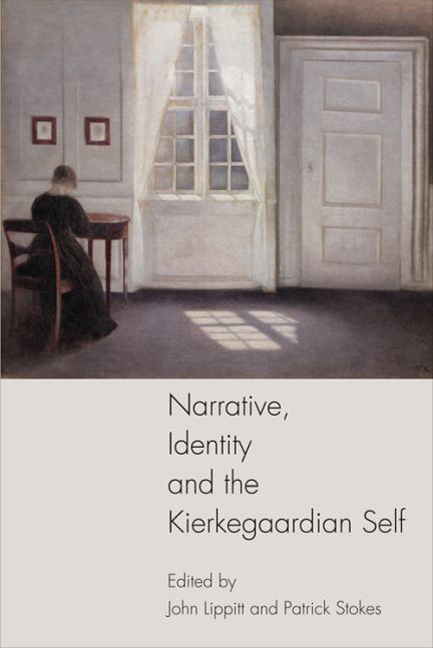Book contents
- Frontmatter
- Contents
- Acknowledgements
- Abbreviations
- Contributors
- Introduction
- 1 The Moments of a Life: On Some Similarities between Life and Literature
- 2 Teleology, Narrative and Death
- 3 Kierkegaard's Platonic Teleology
- 4 Narrative Holism and the Moment
- 5 Kierkegaard's Erotic Reduction and the Problem of Founding the Self
- 6 Narrativity and Normativity
- 7 The End in the Beginning: Eschatology in Kierkegaard's Literary Criticism
- 8 Forgiveness and the Rat Man: Kierkegaard, ‘Narrative Unity’ and ‘Wholeheartedness’ Revisited
- 9 The Virtues of Ambivalence: Wholeheartedness as Existential Telos and the Unwillable Completion of Narravives
- 10 Non-Narrative Protestant Goods: Protestant Ethics and Kierkegaardian Selfhood
- 11 Narrativity, Aspect and Selfhood
- 12 The Senses of an Ending
- 13 The End? Kierkegaard's Death and its Implications for Telling his Story
- Bibliography
- Index
5 - Kierkegaard's Erotic Reduction and the Problem of Founding the Self
Published online by Cambridge University Press: 15 September 2017
- Frontmatter
- Contents
- Acknowledgements
- Abbreviations
- Contributors
- Introduction
- 1 The Moments of a Life: On Some Similarities between Life and Literature
- 2 Teleology, Narrative and Death
- 3 Kierkegaard's Platonic Teleology
- 4 Narrative Holism and the Moment
- 5 Kierkegaard's Erotic Reduction and the Problem of Founding the Self
- 6 Narrativity and Normativity
- 7 The End in the Beginning: Eschatology in Kierkegaard's Literary Criticism
- 8 Forgiveness and the Rat Man: Kierkegaard, ‘Narrative Unity’ and ‘Wholeheartedness’ Revisited
- 9 The Virtues of Ambivalence: Wholeheartedness as Existential Telos and the Unwillable Completion of Narravives
- 10 Non-Narrative Protestant Goods: Protestant Ethics and Kierkegaardian Selfhood
- 11 Narrativity, Aspect and Selfhood
- 12 The Senses of an Ending
- 13 The End? Kierkegaard's Death and its Implications for Telling his Story
- Bibliography
- Index
Summary
For what is it that is at work, even poorly, in any man whatsoever, if not love?
St Augustine (Marion 2012: 272)INTRODUCTION
The ‘signature narrative thesis’ serves particularly well in explaining how personal identity gets constituted through one's reflective consciousness or understanding, although it leaves open the question of how reflective consciousness itself is constituted (cf. Davenport 2012: 2–3). Is the ‘self’ identical to the narrative form of a person's understanding, or is there a deeper self than that which emerges on the reflective level? In contrast to this narrative view, according to recent scholarship the phenomenological tradition unanimously affirms that the core self is to be found in pre-reflective consciousness. Further, Kierkegaard has not only been suggested to be significant for the narrative discussion, but he has also been read as connected to the phenomenological tradition by affirming a similar view regarding situating the core self in pre-reflective consciousness.
In this contribution, I focus on the phenomenological tradition and question the attempt to show that the notion of the self is founded in pre-reflective consciousness and conceived as first-person subjective givenness. This view, as we shall see, is problematic in important ways. Then, I address the relationship between Kierkegaard and the phenomenological tradition, with specific attention to the problem of selfhood. Rather than proceeding directly, however, I argue that we must first consider the ‘erotic reduction’ Kierkegaard describes in his edifying discourse ‘Love Will Hide a Multitude of Sins’ (1843) and Works of Love (1847) before we can consider what we might call his phenomenology of selfhood, for the former holds crucial implications for the latter. As we shall see, not only does Kierkegaard's phenomenology of love problematise the phenomenology of selfhood, but it also raises important concerns for narrative theorists.
Whether Kierkegaard can be read as a phenomenologist has recently been addressed by several prominent Kierkegaard scholars, and this contribution may thus be seen as my attempt to join this intriguing discussion. I wish to do this also in the manner presented by Jeffrey Hanson, the editor of Kierkegaard as Phenomenologist: An Experiment (2010). In other words, this is an experiment. As such, the results and their significance are yet to be fully determined.
- Type
- Chapter
- Information
- Narrative, Identity and the Kierkegaardian Self , pp. 78 - 94Publisher: Edinburgh University PressPrint publication year: 2015



